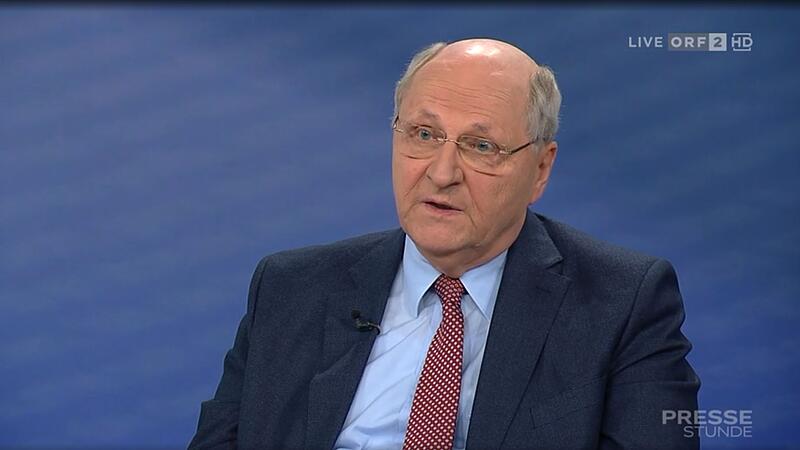Image: Screenshot ORF
It is now a question of how this loss is shared. The sharp rise in prices does not automatically hit those on lower incomes harder, but in a different way. In any case, given the large amount of help in the wake of the crisis, more social accuracy is required, said Badelt in the “ORF press hour”.
Austria’s top debt watchdog locates a partial over-subsidization at companies – and price increases by companies that would not have been justified by inflation. The administration is also required here, for example, it is not justified by the energy prices to increase the parking fees. In principle, however, he thinks highly of making transport more expensive for environmental reasons, especially in the cities.
Video: Christoph Badelt, President of the Fiscal Council, answered questions from Susanne Puller (APA) and Christoph Varga (ORF) in the ORF “Press Hour”:
The fact that inflation is higher in Austria than in other EU countries can also be explained by the composition of the basket from which the consumer price index (CPI) is calculated. Price caps, as introduced by other countries, would have an effect quickly, but the question is how “clever” that is. In any case, the government is not primarily there to fight inflation, but to fight its effects – and a lot has happened here.
Badelt does not reject a price cap for rents, a “pragmatic compromise” is important, which also takes into account the apartment and house owners. The SPÖ idea of a two percent price cap on rents is “objectively not justified” for the well-known economist and top domestic debt guardian. Badelt said of the ÖVP’s proposed abolition of the real estate transfer tax for the first home: “I think it’s nice when there is more property in a community.”
It would be worth considering changing the way rents are linked to the CPI, because with the current solution, tenants would pay the high energy prices twice. It would make more sense to focus more on construction and trade costs.
With regard to the labor shortage, the head of the Fiscal Council stated that there are three starting points for the people living here: more female employment, longer employment in old age and higher qualifications for poorly trained people. Childcare is a major factor in women’s employment. “It’s almost ridiculous how long people have been talking about improving childcare,” says Badelt.
For capital gains taxes
In the “Press Hour” today, Badelt also advocated capital growth taxes, but not taxes on existing assets. If you want to relieve the labor factor, then the question arises as to where other money could come from. “I think a capital gains tax is very sensible from a socio-political point of view,” said Badelt. That could be “reinforced a bit” – taking into account company transfers.
Video: Badelt on the subject of capital gains taxes:
But he also thinks about changing the property tax, said Badelt. This is based on the – low – standard value, here one could “improve”. He considers the decision to reduce corporate income tax (KÖSt), which will be reduced from 25 to 24 percent in 2023 and then to 23 percent in 2024, to be a “mistake”. “If you want to relieve the companies, then please with the non-wage labor costs,” said Badelt, who spoke of an “unfortunate” European competition in terms of KÖSt reduction.
Regarding pensions, the head of the Fiscal Council noted that at the end of the day, increasing life expectancy must lead to a rising retirement age, and this is also about the legal retirement age, not just the actual one. But one would have to compensate socially, he referred to different professions that are more physically demanding.
Badelt was skeptical about Chancellor Karl Nehammer’s (ÖVP) proposal to only grant full entitlement to social benefits to those who have lived in Austria for five years at a time. You have to be “very, very careful not to get into a mood where everything is directed against foreigners”. He was not quite sure which social benefits Nehammer had in mind. “Where that could possibly be targeted would be family allowances or the whole area of social assistance. And I’m very, very skeptical about that.” Because de facto, family allowances would lead to a massive increase in poverty among children, he emphasized.
And as for social assistance, Badelt said it was “the lowest safety net we have”. This is there to keep people economically viable who have no other income. “And if you take away half of them for the first five years because they’re foreigners, then I’d like to know how they’ll live on.” This creates “massive social problems,” Badelt addressed, for example, going into undeclared work or crime.
Regarding Nehammer’s recent call for the government-internal failed unemployment benefit reform, according to which one should receive more money in the first phase but then “significantly” reduce it, Badelt said that he thinks this is reasonable – especially if you are with higher unemployment benefits. At the same time, he pointed out that if unemployment benefits were “shrunken,” the amount would then “become so high that people could no longer afford to live”.
more from economy




